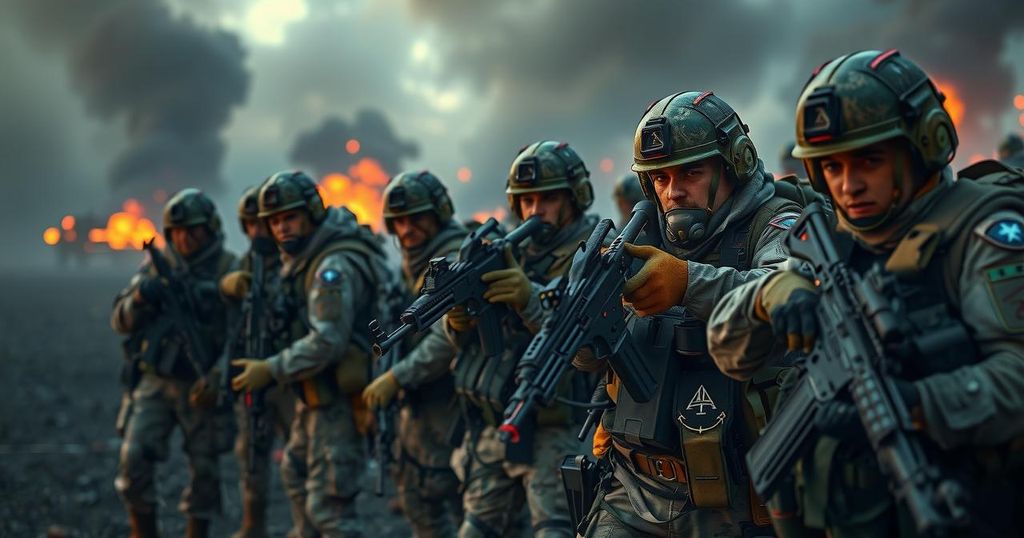Israeli Forces Conduct Raid in Syria Amid Escalating Regional Tensions

Israel conducted a ground raid in Syria, detaining a man alleged to be connected with Iranian militant support. In a separate incident, an airstrike struck a clinic in northern Gaza, injuring six, including children, which Israel denied responsibility for. Netanyahu reiterated the need to curb Hezbollah’s capabilities. The Israeli counteroffensive in Gaza has resulted in significant Palestinian casualties, intensifying the humanitarian crisis.
On Sunday, Israel executed a ground incursion into Syria, capturing a Syrian national alleged to have connections with Iranian networks that support militant groups in the area. This operation marked Israel’s first military engagement in Syria amid the ongoing Middle East conflict, which has persisted for 13 months without interruption. Although the location and precise timing of the raid were not disclosed, the individual detained was identified as Ali Soleiman al-Assi, reported to have resided in southern Syria’s Saida region and under military watch for an extended period. He is accused of being involved in initiatives orchestrated by Iran targeting the Israeli-annexed Golan Heights, near the Syrian border. Body camera footage released by the Israeli army exhibited soldiers apprehending a man in a white tank top within a building, emphasizing the operation’s intensity. The captured individual has since been transported to Israel for interrogation. In a separate incident on the battlefield, an airstrike targeting a clinic in northern Gaza, where children were receiving polio vaccinations, resulted in injuries to six individuals, four of whom were children, according to Palestinian officials. The Israeli military has denied any involvement in this strike. This alleged strike was reported to have taken place on Saturday in an area that has been largely isolated and encircled by Israeli forces for the past year. Reports indicate that Israel has conducted extensive offensive operations in Gaza, leading to substantial casualties and the displacement of tens of thousands. Dr. Munir al-Boursh, the director general of the Gaza Health Ministry, described that a drone strike impacted the Sheikh Radwan clinic shortly after a United Nations delegation had vacated the premises. The World Health Organization and UNICEF have raised concerns regarding the attack, with a spokesman from UNICEF calling it “even more disturbing as the Sheikh Radwan Clinic is one of the health points where parents can get their children vaccinated”. This incident transpired during an alleged humanitarian pause, which was purportedly respected from 6 a.m. to 4 p.m. local time. Israeli Prime Minister Benjamin Netanyahu, during his visit to the Lebanon border on the same day, stated that Hezbollah militants must be reined in beyond the Litani River, irrespective of an ongoing ceasefire negotiation. Netanyahu asserted that preventing Hezbollah from rearming is crucial for the return of residents evacuated from northern regions. He said, “the key to returning our (evacuated) residents in the north safely to their homes is to keep back Hezbollah beyond the Litani, to strike its every attempt [to] rearm, and to respond forcefully against all action against us.” Amidst these developments, Israel continues to conduct military strikes in eastern Lebanon and Gaza, with reports indicating that over 100 projectiles were fired from Lebanon into Israeli territory, of which several were intercepted and others fell in unoccupied regions. Since Hamas’s initial attack on October 7, which resulted in 1,200 deaths and roughly 250 hostages taken, Israel’s counteroffensive in Gaza has reportedly claimed the lives of more than 43,000 Palestinians, according to the health ministry in that territory. Both Hamas and Hezbollah are labeled as terrorist organizations by the United States and several Western nations. Additional reports contain contributions from The Associated Press, Reuters, and Agence France-Presse.
The ongoing conflict in the Middle East has escalated since October 7, 2022, when Hamas militants conducted a significant attack against Israel, resulting in considerable casualties and a prolonged military response by Israeli forces. The tensions in the region are compounded by the roles of various state and non-state actors, including Iran-backed groups like Hezbollah and Hamas, which complicate the security dynamics. Israel’s military operations aim to counter perceived threats from these groups, particularly regarding Iranian influence and military support within Syria and Lebanon.
The recent Israeli military raid in Syria underscores the complex geopolitical landscape of the Middle East, marked by heightened tensions and multifaceted conflicts. The capture of the alleged Iranian agent highlights Israel’s concerns regarding Iranian networks in the region, while the impactful airstrikes in Gaza raise serious humanitarian issues amidst ongoing military operations. As Israeli leaders, including Prime Minister Netanyahu, emphasize the need to decisively counter Hezbollah and ensure regional security, the situation remains volatile and fraught with challenges.
Original Source: www.voanews.com








